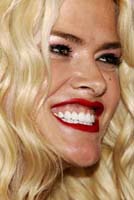Wow, what passionate sentiments were stirred by my blog post about which goddess stories of ancient mythology had parallels to the life story of late celebrity oddball Anna Nicole Smith!
Let me make some quick clarifications, as perhaps the headline treatments of the item, or my own presentation of the ideas were confusing to some.
Both Laurie Sue Brockway and I are in agreement that Anna Nicole is not our idea of a true goddess, or anyone to emulate. That almost went without saying.
I just found it remarkable that Brockway was able to connect Smith’s life story (and untimely demise) to the tales of feminine deities from cultures long past. The parallels with Babylonian goddess Innana I found especially moving. Here’s what Brockway said:
* In the end, [Anna Nicole Smith] was Innana of ancient Babylon, the goddess of sexuality. Once the Queen of Heaven, and the goddess of Love and War, when her sacred lover/son Tamuz was killed she had to travel seven layers down to the underworld to save him, stripping her earthly possessions, clothes, jewels and egos as she traveled through each level. There she met her dark twin and had to face her before she could rise again and save her love. Just as Innana could not bear the pain of losing Tamuz, I believe Anna Nicole could not bear losing her son Daniel. Perhaps she sacrificed herself to be with him again.”
It’s amazing when ancient myths we’ve never heard of seem to shed light on contemporary events.
In the best-selling book “Women Who Run With the Wolves,” Jungian analyst Clarissa Pinkola Estes similarly uses old fables and myths (not all of them uplifting) to help contemporary women see themselves, and find meaning in their own life’s narrative. I don’t see this as a liberal feminist practice necessarily, but I guess it springs out of disenchantment with our pre-1950 cultural focus on patriarchial war stories, or male-dominated tall tales like Hercules, King Arthur, or Paul Bunyan (to name the first that come to mind).
Anna Nicole Smith’s sad story has poetic, metaphoric themes in it we can delve into as we would when seeking to understand a character in a novel (that’s why we read literature, right?). But she was a real person, a pretty girl who apparently felt she couldn’t nurture any child to autonomy or health, the ultimate happy outcome all moms long for most. She may have been a gold digger, or an overblown, cartoonish parody of a woman with real goddess power. But let’s not discount or discard the dear lady in the wake of her death. Let’s not let the culture’s cynicism lull us into thinking that her story isn’t mythic. I was surprised that a few of my readers derided Smith as a “drunk” instead of calling her an addict like so many Hollywood types before her whose life got distorted by the Fun House mirror.
Here’s a blog post I like by Diana Butler Bass that is easy for everyone to process and appropriately charitable.

